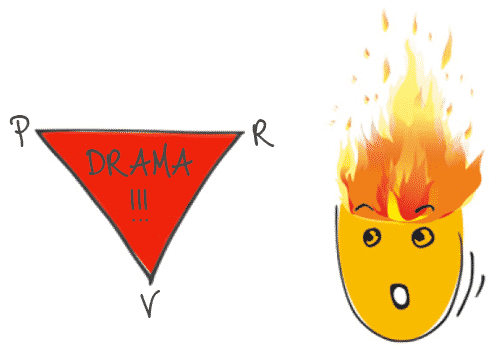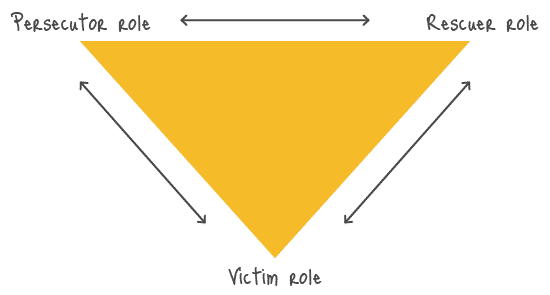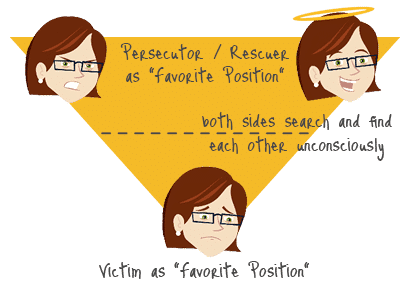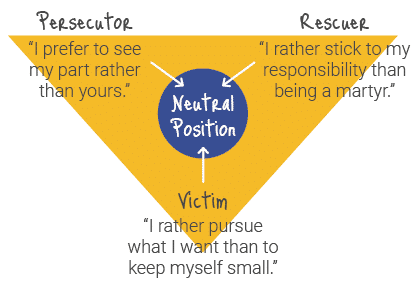No More Stressful Relationships - The Transactional Analysis Drama Triangle

1. Drama-Triangle - What's This?
The Drama Triangle in Transactional Analysis describes three possible positions a person can be in that may lead to sincere entanglements. It consists of the rescuer position, the persecutor position and the victim position. With the aid of the drama triangle an interaction pattern can be presented. It also reveals a specific communication structure. People are not per se rescuer, persecutors or victims. They only behave as such in certain situations. In doing so, they always mask out one or more aspects of reality and devalorize them. At the same time, they avoid having to question their relationship concept and their basic beliefs.
A behavior within the drama triangle creates drama in relationships. This means that, ultimately, all those involved will at least feel bad.
If you can act and communicate from outside the drama triangle, you don't play a role and thus take a neutral position. To not take up a role has several advantages. It avoids relationship dramas in the long run and thus contributes to a joyful life. Drama is tackled from two sides: On the one hand you do not invite other people into the drama. On the other hand you don't respond to drama invitations from others. Like this, you set an end to the negative spiral in the drama triangle. Therefore, the alternative behaviour is to not take a position at all, but to recognize the temptations and to resist them.

The tricky thing about the drama triangle is that you often start in one position but change roles during a conversation for example. This changes the relationship dynamics. Everyone involved feels confused or misunderstood.

2. Drama Triangle Transactional Analysis - the Rescuer Position
People that take the rescuer position are generally perceived by society as generous and helpful. However, they also tend to unconsciously devalue others in their ability to think for themselves and act responsibly. Their basic and unreflected idea of how to relate to others is to give. Only when they give more than they take do they believe they are connected in a relationship. They do this out of a caring parenting position. Thus, the relationship partners tend to be children!
People act as the rescuer because it puts them in a supposedly beneficial position. Their basic belief in life is: "I am okay when I can help others." They learned in their childhood that mom or dad acknowledged their offer to help and their childlike care. To be caring, they need to be focused on the deficiencies of their reference person. Thus, all people they are dealing with are deficient in some way and therefore need support.
A person occupying the rescuer position:
- worries about others: The father complains on the phone about how horrible everything is. His daughter becomes more and more worried about her father and feels obliged to help him.
- helps without being asked for help: A participant reads aloud during a seminar. He or she cannot read something correctly. Immediately another seminar participant comes to the rescue and completes the corresponding word.
- does things they don't really want to do: he offers his translation skills - without appropriate compensation. Only later does he realize that he is actually burnt out and overwhelmed.
Learn about the Drama Triangle and more helpful concepts in my video course:

3. Drama Triangle Transactional Analysis - the Persecutor Position
People that favor the persecutor position in the drama triangle Transactional Analysis are often perceived as dogmatic, self-assured or strict. They know how to invite others to take a defensive role. It is important for them to feel superior. They know exactly what is right and what is wrong and they strongly think in black and white categories. They often appear like supercritical parents or teachers.
People taking the persecutor role often devalue others in their person. Persecutors occupy the position: "I'm alright, the others are not okay." This is similar to how the rescuers' view. "My boss will never becomes a real leader." "My ex is incapable of communication." "All idiots" - these could be utterances of a human occupying the persecutor position.
Persecutors pursue because their behavior justifies them feeling smarter, stronger, and superior. They share the basic conviction "I'm okay, the others are not okay." They reaffirm this belief by making other people their victims. People whose favorite position is the persecutor need other people whom they can feel superior to. Be it the neighbors, friends or the other football team. The idea of being on an equal footing with others causes them discomfort. But actually, being "not better" is an opportunity for them.
People taking the persecutor role
- know it better: "It's right the other." "That's what you do." "This is how it should be done."
- strive to be hierarchically superior: The persecutor determines the place in the café, goes ahead.
- accuse others: "That's your fault alone."
4. Drama Triangle Transactional Analysis - the Victim Position
People who occupy the victim role often present themselves as weak and helpless to others. These individuals denigrate their own person, their ability to think and their sense of responsibility. They show a weak self-confidence to the outside.
A real victim is - in contrast to the drama victim - through no fault in an emergency situation and contributes nothing to this situation. For example, a drowning man. Among other things, real victims can be recognized by the fact that they are grateful to their rescuers. This has nothing to do with the drama triangle.
Victims in the sense of the drama triangle contribute to their own situation. They also make no effort to get out of their position. With their behavior they invite potential rescuers in the sense of the drama triangle to take rescue actions. A drama victim unconsciously seeks their suitable drama rescuer or persecutor and vice versa. There is a perceived pull between the role-holders, which makes it interesting for both to communicate within the drama triangle.

5. Drama Triangle - The Exit
Now that we've looked at how the drama triangle's roles are structured and how they work, I'd like to give you some ways to get out of the drama triangle.
In principle it can be helpful to make a general decision against dramas in relationships and instead opt for taking responsibility and active relationship design. Such a decision could look like this:

Another important step is to know your own favorite role - how do you get invited to it and how do you live it? Can you name the concrete behavior and how you react in your role?
For example, my "favorite role" is the rescuer position. When my girlfriend came to me with a problem (invitation), I responded with well-intentioned advice (behavior) and was angry later, if she had not follow it (role change in the persecutor).
When I became aware of my "favorite role," I only responded by listening, paying attention to her problem, and being compassionate.
6. Suspend the Drama Triangle Entirely
You can ignore invitations to the drama triangle. Pretend you didn't hear the invitation and continue with what you have done so far. A friend writes me a message in which he tells me again and again about the same problem with his lover. I ignore his message.
Don't take on tasks that you don't really want to do! There are people who listen for hours to the whining of their friends and family members and become exhausted. You could announce in a relaxed situation that you no longer want this. There are also overworked employees who jump in the breach for their sick colleague and ultimately get burnt out. Again, it is worthwhile to take care of yourself and your own physical signs, such as pain or tiredness.
It is worth staying true to yourself (in partnerships, with family, friends and at work) and only doing the things you really want to do. Any resulting unpleasant feelings (such as a feeling of guilt) are initially normal. "You get them for free when you're developing," my Transactional Analysis mentor would frequently say. So, once again, if you feel the urge to take the role of the rescuer, you can just let it happen and see what happens if you do not intervene. In addition, you give other people the opportunity to take their own responsibility.
People who prefer to occupy the persecutor role can begin to reconsider their attitude towards other people. For example, when you condemn someone for their behavior once again, think of a situation in which you behaved similar yourself. The persecutor role can also be seen as a protection. I protect myself by feeling superior and attacking others in order to not face my own weaknesses. Genuine self-esteem does not result of making others smaller for standing stable.
A person preferring the persecutor position has the opportunity to ask, "How would I feel, think and behave, if I considered others to be responsible and okay?"
For people who favor the victim position, it is important to develop their own thoughts and self-responsibility. You may ask, "If a miracle happened overnight and I could think and act on my own responsibility, how would I behave?"
Persons in the victim role have not learned to take charge. Often out of fear they may lose too much - a thought of childish nature. You may ask yourself: "What price am I willing to pay to bring ... into my life?"
Suppose you want to learn small talk. You might be asking yourself: "What price am I willing to pay to use small talk successfully?" Think of time, money, negative emotions - such as shame - relationships, risk of failure in percentage or will power. You could then come to the following statement: "My price:
- I practice three times a week for an hour.
- I buy three books on the subject and read them.
- I am ready to endure my fear.
- I take the risk of being rejected by others.
- Should it not work with this price, I will book a course.
- I am willing to invest a total of 500 € in this ability.
- My risk of failure is currently estimated at 80% at the beginning. That means out of 10 small talk situations, I will manage 2 successfully. But at least I will also be successful twice. With practice, my percentage will improve. "
We could say so much more about the drama triangle Transactional Analysis - more ways to exit and to analyze, more possibilities of what you can do if someone else tries to pull you into the triangle, etc.
ENHANCE YOUR COMMUNICATION SKILLS
FREE Compact Course

- Communicate successfully in your professional life
- Enhance conflict management skills
- Understand others better
Learn Transactional Analysis with the Compact Course. Emails, Videos, PDF-Exercises.
No Spam. Unsubscribe at any time.

